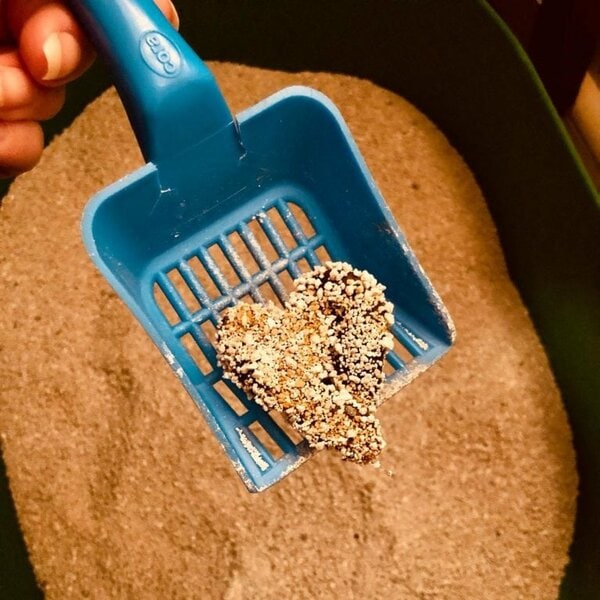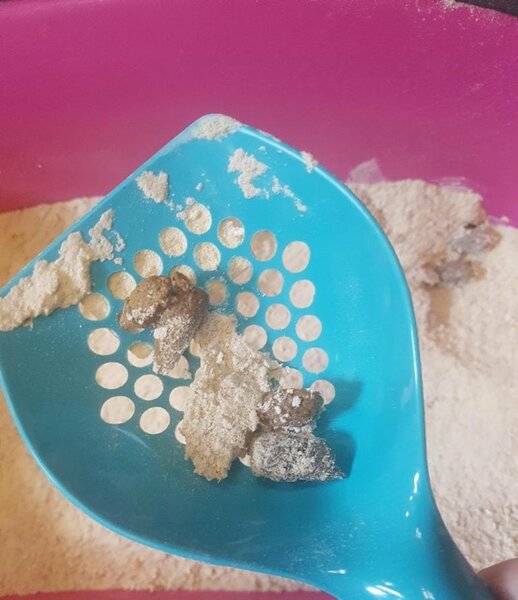What we ideally want and what happens in real life don’t always align. So, while you expect your house-trained dog to exhibit a perfect, almost human-like behavior, you could occasionally notice some awkward habits that you don’t fancy. You may have observed one of these in your canine companion—her fondness for your cat’s poop. Coprophagia—that’s what this act is called—is quite disgusting and not many dog owners are happy to see their pet doing that.
Understandably, your immediate concern is how to put a stop to this repulsive behavior. Improving her diet to make sure that she’s not hungry, in combination with a few other actions like keeping her away from your cat’s litter box and keeping her engaged regularly, would go a long way in ending your pooch’s obsession for your cat’s poop.
However, you should first try to understand the reason behind your doggie’s proclivity for this despicable act. In this post, we explain the likely reasons behind this undesirable dog behavior and its ramifications. You will also learn how to stop the behavior in your dog.
Why Is My Dog Eating Cat Poop?
Dogs are not perfect. Some of their behaviors that you find repulsive are natural and they don’t make the dog bad, or ‘mad’. Below are some of the reasons why your doggie seems to like her feline neighbor’s poo.
Natural Dog Behavior
Well, consumption of fecal material isn’t normal for a sane human being. However, this is not the same for canines.
It is a normal habit for a mother dog to eat her pups’ defecation to keep the litter clean. The young canines notice this and they may try to get in on the act themselves. And while most dogs will stop this habit as they grow, some keep it and continue to eat poop even into adulthood.
Dogs Are Attracted To Cat Food
Dogs are natural scavengers. They eat almost anything they can get their mouths into. Poochies are particularly attracted to strong smell. And while you can differentiate cat poop from cat food, your pooch may be unable to do so. Hence, cat poop may appeal to the dog the same way cat food does.
Nutritional Deficiency
Many dogs develop a strong liking for cat excreta due to malnutrition or hunger. This does not necessarily mean that you are not feeding your pet well.
Other than poor diet, digestive disorders like Cushing’s disease and intestinal malabsorption or maldigestion can cause malnutrition. Also, other diseases such as diabetes mellitus can make your dog rapaciously hungry. To the doggie, feline feces is a source of vital nutrients.
Knowing whether your dog’s undesirable habit is a behavioral issue or simply nutritional will make it easier for you to know how to deal decisively with the issue. In the next section, we discuss ways of putting a permanent stop to coprophagia in your dog. Keep reading.
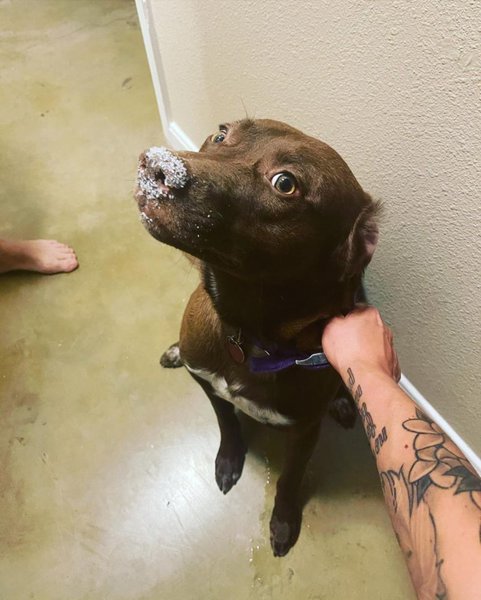
How Do I Stop My Dog From Eating Cat Poop?
The first thing to do if you notice your poochie popping poops is to fix an appointment with your veterinarian. The doctor will let you know if the dog has a dietary issue or not.
The percentage of dogs that take to eating poop as a way to compensate for inadequate nutrition is minimal. However, you can’t rule out this possibility for your four-legged furry friend.
Improve Your Dog’s Diet
If the diagnosis shows that your dog has intestinal worms or other parasites, the doctor will treat her. If the issue is caused by inadequate nutrition, it may be because your pet’s diet is hard to digest. This means you have to change your dog food to one that is easier to digest.
We recommend a diet that contains higher protein, fat, and fiber levels than the previous one. Pet Plate has checked all the boxes for a healthier and fuller diet your pooch will require.
In addition, you should increase the vitamin intake of your pet. This, together with the methods below, will help wean your doggie off cat poop.
Train Your Dog To Shun Cat Poop
Your canine companion’s obsession with eating feces, in most cases, is a behavioral issue. You can teach it to change its habits.
Some dog owners resort to punishing their dogs to correct this behavior. This may not be effective. By punishing your dog, you are teaching her to be more discrete while carrying on the act. So, when you are not around, the dog may still raid the litter box secretly and have her fill of your cat’s excrement.
Instead, you should encourage your pooch to desist from eating poop by incentivizing her. When you see her pacing around the cat litter box, command her firmly to leave. Reward her with a treat if she obeys. If she doesn’t, repeat your command, this time a little louder. With time, she will understand that you don’t want her around the litter box.
Keep Cat Litter Out Of Your Doggie’s Reach
The easiest way to prevent your dog from eating feline fecal deposits is to set a barrier that makes it impossible for your dog to access the cat litter.
Find a spot in your house where the dog cannot get to and keep the litter there. If this is not possible, you can get an indoor fence or baby gate to demarcate your cat litter’s corner.
There are many indoor fences online. You will easily find one whose specifications will serve this purpose. The most important thing to take note of is the space between the bars of the fence. It should be wide enough to allow your cat to pass through but too narrow for your dog.
Get A Dog-Proof Cat Litter Box
Your dog can easily access the poop in an open-top litter. Therefore, if you have been using an open-top litter, you shouldn’t really blame your dog for heeding this open invitation.
A closed litter box will stem the smell of your cat’s poop. And if your dog perceives the smell, the small opening will ensure that your dog has a really tough time trying to stick her head inside.
Enclosed cat litter boxes come in several shapes, sizes and designs. You will find one that matches your aesthetic and functional requirements by doing a quick search online.
Always Keep The Litter Box Clean
Your pet eats poop because it is available. What if the doggie cannot find cat poop? It’s simple. All you need to do is make sure your cat litter box is clean at all times. This means you have to clean the box as soon as your cat poops. This is hardly realistic because you can’t keep watch over your feline pet all the time.
However, you can solve this problem by getting a litter box with a self-cleaning feature. With this type of litter box, you don’t have to ‘babysit’ your cat all day.
Add Poop Repellent
Dogs have a strong sense of smell. You can capitalize on this by using poop repellent. Adding poop repellent to your cat’s food can alter the smell of her poop, making it unpleasant for your canine pet. However, cats are quite meticulous about what they eat. Your cat may refuse to eat once she notices the change caused by the poop repellent.
A better way to go about this is to add poop repellent directly to your cat poop or the litter box. Simply drop some black pepper or hot sauce in the litter box. Your pooch will sneeze once it perceives the pepper while sniffing the poop. This unpleasant experience can make her rethink her stance.
Keep The Dog Occupied
Another common method to stop your dog from eating poop is to keep her busy. Dogs can get bored easily. And if you don’t keep your furry companion engaged, she will try to explore on her own. This could lead her to your cat’s space.
Regularly keeping your furry friend busy with healthy tasks will help to prevent this situation. Exercise your dog often. Take her out for a walk every day. You can also keep her busy with toys and other interactive games.
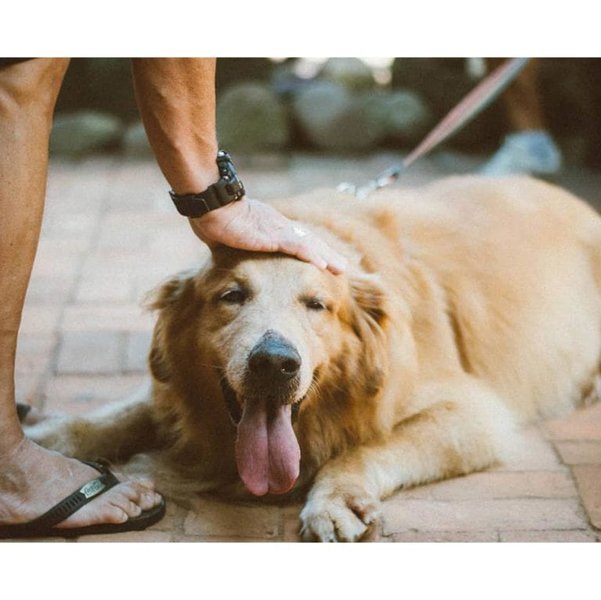
What Can My Dog Get From Eating Cat Poop?
Eating cat poop can cause your dear pooch to fall sick if the cat poop contains harmful microorganisms. Also, the chemicals in cat litter can be unhealthy, and the cat litter can get clumped and block your Fido’s intestines.
Intestinal parasites like hookworms, roundworms, whipworms, and Giardia can be very dangerous. These could lead to vomiting, diarrhea, weight loss, and anemia in your dear Fido.
Apart from these, eating cat feces can also transmit certain bacteria and viruses to your canine companion. These include salmonella, rabies, brucella, and staphylococcus. And you should be concerned about your health because your pet can transmit these bacteria and viruses to you if she is infected.
Nevertheless, you have nothing to worry about if your cat is healthy. Many dogs will not develop any health problems from merely eating cat poop. Moreover, many cat infections are cat-specific and cannot affect dogs. In fact, cats cannot transmit some of the dog infections attributed to eating feline feces.
One of such infections is neosporosis. This disease is particularly lethal in dogs and cattle. It causes neuromuscular degeneration in infected animals and can lead to death in young puppies while causing paralysis in adult pooches.
Moreover, neosporosis is one of the leading causes of abortion in cattle. Dog owners have good reasons to be wary of the disease.
Put your mind at rest. Cats cannot shed oocysts of Neospora in their poop because they are not definitive hosts of the parasite. Therefore, your dog cannot get neosporosis from eating cat poop.
Neosporosis is caused by Neospora caninum, a single-celled parasite that lives in the intestinal tract of some mammals. Dogs get neosporosis from eating meat from contaminated cow meat, chicken, or wild animals. Puppies can also get it from their infected mother at birth.
While your doggie won’t get neosporosis from eating cat poop, the likelihood of getting infections like toxoplasmosis and parvo makes cat poop toxic for your dog. You’ll learn about these infections in the following sections.
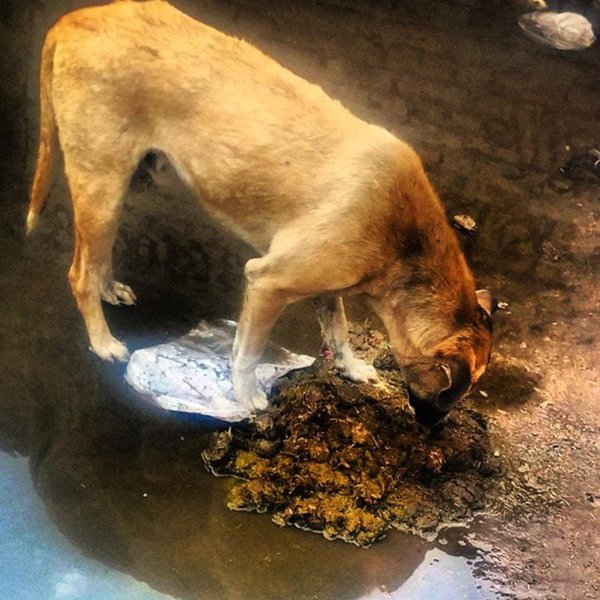
Can A Dog Get Parvo From Eating Cat Poop?
Yes. Your dog can get parvo from eating feline fecal deposits. An infected cat can pass the virus in her stool.
Can A Cat Be Infected With Canine Parvovirus?
You can be forgiven for thinking that your feline friend cannot host canine parvovirus and is immune to the disease. After all, you might be thinking, canine parvovirus is the name and should expressly refer to a disease that exclusively affects canines.
Therefore, the revelation that your feline pet can transmit parvo to its canine neighbor might come as a surprise to you.
Parvo is a popular word among dog owners. But many people still don’t understand much about the disease. It is a highly contagious disease that is particularly prevalent in dogs. However, recent studies have shown that felines are susceptible to a strain of this virus known as CPV-2a.
And while your infected feline friend may not show symptoms initially, she will continue to shed the virus in her feces. Eating her poop will spell doom for your dear Fido.
Parvo Symptoms
Not only is parvovirus common in dogs; it is also fatal. The disease is virulent and has a high mortality rate.
Sudden lethargy and loss of appetite in your dog could be signs that your dog has been infected with parvo. Other symptoms include dehydration, vomiting, and diarrhea.
Diagnosis And Treatment
Detecting the virus early is very crucial. Most dogs die within 48 to 72 hours of showing the symptoms listed above. Therefore, if you want your dear Fido to have a chance at survival, you should quickly get her examined once you notice these symptoms.
There is no standard treatment for parvo. Treatment essentially means trying to improve the dog’s immune system to make her strong enough to fight the virus. This treatment consists of treating diarrhea and vomiting, and replacing lost protein, electrolytes, and fluid. Proper care can give your dog up to a 95% survival chance.
Vaccination
The popular saying that prevention is better than cure is true for parvo and dogs. The surest bet against this virus is to vaccinate your feline and canine companions. Vaccination brings down the likelihood of your pets getting infected with the virus.
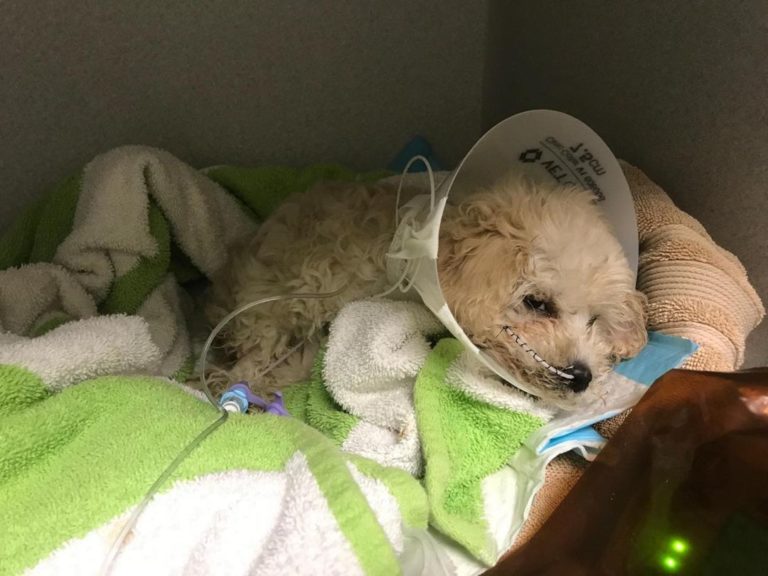
Can Dogs Get Toxoplasmosis From Eating Cat Feces?
Pooches will get infected if exposed to toxoplasma, the parasite that causes toxoplasmosis. If your cat is infected, she will shed the oocytes (egg cells) in her fecal release. Your pooch can ingest a considerable quantity of the parasite by eating the poop of an infected cat.
Unlike parvo, toxoplasmosis affects a wide range of animals, including mammals, birds, and many other warm-blooded animals. Therefore, your feline and canine companions are at risk. Not only that, but you’re also at risk of getting infected with this parasite. You don’t have to worry. It is generally non-lethal in humans.
Toxoplasma, once ingested, is active in the stomach and lower intestine. It then spreads to the other parts of your dog’s body. The disease can be fatal if not treated on time.
Toxoplasmosis Symptoms
Most of the symptoms of toxoplasmosis are generic. They are the symptoms that you’ll notice for many other illnesses in pooches. These include lethargy, fever, diarrhea, weight loss, and loss of appetite.
You may observe some peculiar anomalies that indicate where the parasite is most active in your pet’s body. Diarrhea and jaundice may indicate its presence in the digestive tract, pneumonia might mean that it’s present in the lungs, and paralysis shows that it’s active in the nervous system.
If you notice any of these symptoms in your Fido, don’t hesitate to take her to a veterinarian.
Diagnosis
Diagnosis of toxoplasmosis involves conducting a series of lab tests. Because the symptoms are pretty much generic, your doctor would certainly not be testing for toxoplasmosis alone.
A serological test for toxoplasmosis will ultimately be required. This will allow the doctor to know the nature of the infection—whether it is active, dormant, recent, or long-term. This test will also help the doctor to determine the toxoplasma antigen level in your rover.
Treatment
Treatment of toxoplasmosis is usually straightforward. The doctor will usually prescribe antibiotics and some other drugs to stem the infection and boost your dog’s immune system. However, in critical cases, the vet may decide to hospitalize your dog for intensive care.
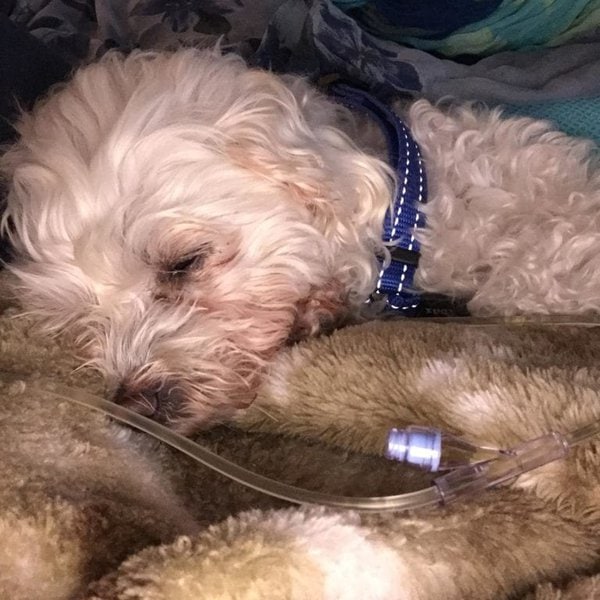
How Do You Dispose Of Cat Feces?
Scoop it from the litter box, seal it in a biodegradable bag and dump it in the trash.
Keeping your cat litter box clean at all times is probably one of your most arduous tasks as a cat owner. Nevertheless, it is a must.
Cleaning your cat litter box clean regularly prevents the unpleasant smell of cat poop from pervading the atmosphere. You don’t want your guests holding their noses when they come visiting, do you?
Cleaning becomes even more necessary if you keep dogs. Your canine companion can feel tempted to eat her feline housemate’s fecal deposits. And the best way to prevent this is to regularly get rid of the feces in the cat litter box.
One thing to avoid when disposing of cat feces is dumping the litter directly into your trash can. Also, don’t dump it outside in the open or try to burn it. Doing any of these can cause grave health or environmental issues.
In addition, don’t compost your cat litter. The microorganisms in the poop will contaminate the soil and make it unsafe for growing food.
One common question that people ask is whether they should flush cat litter. Flushing cat litter is not advisable. Waste treatment plants may not effectively filter out most of the viruses and bacteria contained in cat poop. These will remain in the water system and can cause serious infections.
Apart from this, cat litter can block your pipes and cause serious plumbing issues. While this is especially true for clay litters, many of the biodegradable litters marketed as flushable are not much better. The wise option is to eliminate any possibility of damaging your pipes by avoiding using the toilet.
You can certainly put your money to better use than spending on avoidable plumbing repairs.
